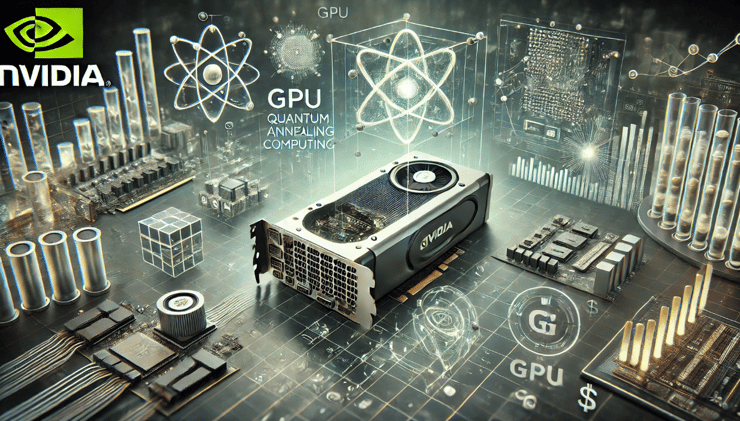Researchers at Nvidia have made significant progress in their pursuit of building a fully functional, commercially viable quantum computer using supercomputer simulations with graphical processing units (GPUs). This breakthrough has the potential to revolutionize various industries and offer unprecedented solutions to complex problems.
Quantum Computing Basics
At its core, quantum computing operates differently from classical computers. Unlike binary switches used in traditional computers, quantum computers use qubits, which exploit the nature of physics to perform complex computations far beyond the capabilities of classical binary systems.
What are Qubits?
Qubits (quantum bits) are the fundamental units of quantum information. They can exist in multiple states simultaneously, allowing for the processing of vast amounts of data in parallel. This unique property enables quantum computers to solve certain problems exponentially faster than their classical counterparts.
Key Differences Between Classical and Quantum Computers
| | Classical Computers | Quantum Computers |
| — | — | — |
| Processing Unit | Binary switches (0s and 1s) | Qubits (multiple states simultaneously) |
| Computational Speed | Relatively slow, due to sequential processing | Exponentially faster for certain problems |
| Data Processing | Sequential processing of data | Parallel processing of vast amounts of data |
Development Approaches
There are various approaches to building a quantum computer, each requiring expensive infrastructure, advanced engineering, and cutting-edge research in theoretical math and physics. Two of the most common methods are quantum gating and quantum annealing.
Quantum Gating
Quantum gating involves using logical gates to manipulate qubits and perform complex operations. This approach is more versatile but also requires a high degree of precision and control over the qubits.
Quantum Annealing
Quantum annealing, on the other hand, relies on thermodynamic processes to find the optimal solution to a problem. It uses magnetic particles to explore the vast solution space, allowing for efficient optimization.
Nvidia’s Focus on Quantum Annealing
Nvidia is focusing on developing a quantum annealing system, leveraging its extensive experience with GPUs in gaming and artificial intelligence. By using supercomputer simulations with GPUs, Nvidia is uniquely positioned to pursue quantum computing research and accelerate the development of commercially viable quantum computers.
Research Progress
In a recently published paper, Nvidia researchers described using hundreds of thousands of GPUs in multiple clusters to simulate the behavior of a quantum annealing system. These simulations showcased Nvidia’s pioneering use of GPUs as a powerful alternative to traditional supercomputer simulations with CPU clusters.
The research team addressed a longstanding issue in annealing systems where magnetic particles would abruptly change behavior. Through simulations, they proposed a solution involving the manipulation of magnetic fields, potentially bringing full-service quantum annealers closer to market readiness.
Simulating Quantum Annealing with GPUs
To simulate the behavior of a quantum annealing system, Nvidia researchers employed hundreds of thousands of GPUs in multiple clusters. These simulations were conducted using a custom-built software framework that leveraged the parallel processing capabilities of GPUs.
The results demonstrated that GPU-based simulations can efficiently model large-scale quantum systems, paving the way for the development of commercially viable quantum computers.
Potential Impact of Quantum Annealing
Quantum annealing systems are specialized quantum computers designed to solve specific problems. Unlike general-purpose gate-based quantum computers, they are expected to address optimization challenges across various industries, including:
- Quantum Sensing: Enhancing sensitivity and accuracy in sensing applications
- Transportation: Optimizing logistics and supply chain management
- Shipping and Logistics: Streamlining shipping routes and cargo handling
- Energy: Improving energy efficiency and optimizing resource allocation
- Finance: Enhancing forecasting, portfolio management, and diversification
- Blockchain: Accelerating transactions and improving security
In finance, for example, quantum computing could significantly enhance accuracy in forecasting, portfolio management, and diversification. This is particularly relevant in today’s fast-paced financial markets, where even minor inaccuracies can result in substantial losses.
Conclusion
Nvidia’s advancements in GPU-based quantum computing mark a significant milestone in the field. As the technology progresses, the potential applications of quantum annealing could revolutionize various industries, offering unprecedented solutions to complex problems. With continued research and development, the future of quantum computing looks promising.
Future Directions
As researchers continue to explore the possibilities of quantum computing, several areas warrant further investigation:
- Scalability: Developing more efficient methods for scaling up quantum computers
- Error Correction: Improving error correction techniques to maintain high accuracy in large-scale systems
- Quantum Algorithms: Developing practical algorithms that can efficiently solve real-world problems
By pushing the boundaries of what is currently possible, researchers and developers can unlock new opportunities in fields such as finance, energy, and transportation. The future of quantum computing holds much promise, and Nvidia’s recent breakthroughs are a significant step towards realizing its potential.

